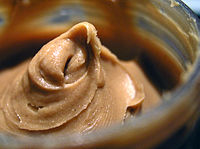- Nut butter
-
A nut butter is a spreadable foodstuff made by crushing nuts. The result has a high fat content and can be spread like true butter, but is otherwise unrelated. Nut butters include:
- Almond butter
- Cashew butter
- Hazelnut butter
- Macadamia nut butter
- Peanut butter
- Pecan butter
- Pistachio butter
- Walnut butter
The almond, cashew, macadamia, peanut or pistachio are not true nuts in a botanical sense. However, because they are considered nuts in a culinary sense, their crushed spreads are called nut butters. Similar spreads can also be made from seeds not considered nuts in a culinary sense:
- Pumpkin seed butter
- Sesame seed butter (usually called tahini)
- Soybean butter
- Sunflower seed butter
Nut and seed butters are rich in protein, fiber, and essential fatty acids and can be used to replace butter or margarine on bread or toast.
The following table gives some of the nutritional properties of a selection of nut and seed butters:[1]
Butter Calories
(1 tbsp.)Protein
(g)Fat
(g)Calcium
(mg)Zinc
(mg)Almond butter 101 2.4 9.5 43 0.5 Cashew butter 93 2.8 8 7 0.8 Hazelnut butter 94 2 9.5 N/A N/A Peanut butter - natural 94 3.8 8 7 0.4 Peanut butter - reduced fat 95 4 6 N/A 0.4 Sunflower butter 80 3 7 N/A N/A Soy butter (sweetened) 85 4 5.5 50 N/A Soy butter (unsweetened) 80 4 6.5 30 N/A Soy-peanut butter (added sweetener) 50 2 1.2 40 N/A Tahini 89 2.6 8 64 0.7 See also
References
- ^ Reed Mangels (November-December, 2001). "Guide to Nuts and Nut Butters". Vegetarian Journal. http://www.vrg.org/journal/vj2001nov/2001novnuts.htm. Retrieved 2006-08-07.
Categories:- Spreads
Wikimedia Foundation. 2010.

